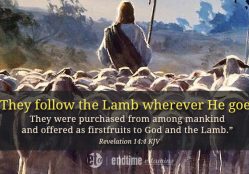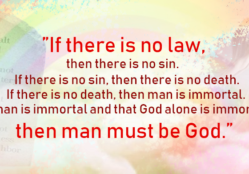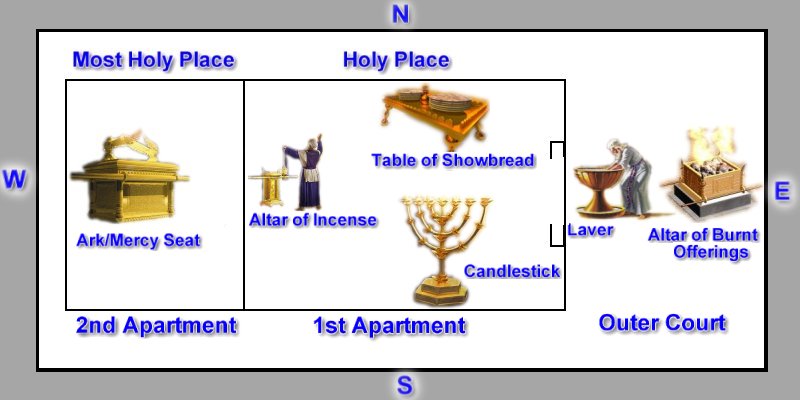3 Things every Christian should do for a sanctified life–nothing else
Repenting of sin, confessing, trusting in what Jesus can do in our lives, and having been baptized are all important, and take place at the beginning of our Christian lives. What to do after that? How to grow as a Christian and have a meaningful life?
In this article, we will learn the three must-haves in Christian life as revealed in God’s holy sanctuary in order for us to grow spiritually while waiting for His soon return. The last is usually the one being neglected.
God’s sanctuary, the best object lesson
“Thy way, O God, is in the sanctuary: who is so great a God as our God?”
Psalm 77:13 KJV
The earthly sanctuary was given to Moses, with its ceremonies now obsolete, but the lessons and its spiritual applications still apply to us in an absolute and compelling way as the verse suggests above.
Further, the Book of Hebrews tells us that there is a sanctuary in heaven, from which the earthly sanctuary was copied from, where Jesus is the Lamb, the High Priest, and the King of Kings. When we study the sanctuary we will certainly see Jesus, the Way, Truth, and Life.
As seen in the diagram above, the sanctuary is divided into four sections: Encampment, Outer Court, Holy Place, and Most Place. These sections represent different stages of Christ’s work in the plan of salvation as well as one’s spiritual journey, with the culmination of God finally being with His faithful in the new heavens and new earth eternally.
The Encampment is where the spiritual life of a person begins. It is where one realized his or her need for a Savior. The Outer Court represents justification where repentance, confession, and baptism happen. The Holy Place where Candlestick, Table of Shewbread, and Altar of Incense are found is where sanctification occurs. The Most Holy Place symbolizes the unhindered access and communion of God with His people which is the culmination of a Christian’s experience (glorification) which commences at Jesus’ second coming.
This article is concerned with the sanctification process, i.e. after a believer accepts Jesus through repentance, confession, and baptism. We will look closely at the meanings of the furniture found in the Holy Place.
Sanctification is God’s way of making His followers fitted to be citizens of the new heavens and new earth. It is a process, a life-long manner, not a one time experience.
The three pieces of furniture found in the Holy Place represents the three must-haves in a Christian experience while waiting for Jesus’ second coming.
1. Studying the Bible continuously (Table of Shewbread)
The Table of Shewbread represents the assimilating of Jesus’ character through the study of the Word of God. Jesus said:
“I am the living bread which came down from heaven: if any man eats of this bread, he shall live forever…” John 6:51
The twelve pieces of bread for the twelve tribes of Israel represent complete food for the people of God, that there is sufficient spiritual food for everyone.
“This bread is to be set out before the Lord regularly, Sabbath after Sabbath, on behalf of the Israelites, as a lasting covenant.” Leviticus 24:8
It must be new every Sabbath and stays there every single day. Do you get fresh bread of life each Sabbath and continuously absorbing and digesting spiritual food all throughout the week?
On top of each stack of six loaves is frankincense. Incense represents prayer.
“And thou shalt put pure frankincense upon each row, that it may be on the bread for a memorial, even an offering made by fire unto the Lord. ” Leviticus 24:7
Reading the Bible must always be accompanied by prayer. This is the way we nourish ourselves for righteousness.
“Also put salt on each of your grain offerings. The salt of God’s promise must never be left out of your grain offerings. Put salt on all your offerings.” Leviticus 2:13
Salt seasons and preserves the food. Likewise, the salted and unleavened bread of life gives hope, peace, encouragement making one’s life a meaningful one. The Word of God makes one wise against temptations and cunning devices of the enemy, preserving his life for eternity.
“But we all, with open face beholding as in a glass the glory of the Lord, are changed into the same image from glory to glory, even as by the Spirit of the Lord.” 2 Corinthians 3:18
If we continually and prayerfully study the Bible we constantly see Jesus and it will surely change us into His character.
2. Have a prayerful life (Altar of Incense)
The Altar of Incense represents the prayerful life of a Christian believer. Even though the Altar of Incense is in the Holy Place but its orientation is facing the Most Holy Place with the gap of the curtain wall separating the first and second compartment.
The sweet-smelling scent coming from the Altar of incense goes to the Ark of the Covenant where the Mercy Seat is placed. The Mercy Seat represents God’s holy throne. Through the ministry of the High Priest, our prayers are welcoming fragrance in the throne of God.
“As the priests morning and evening entered the holy place at the time of incense, the daily sacrifice was ready to be offered upon the altar in the court without. This was a time of intense interest to the worshipers who assembled at the tabernacle. Before entering into the presence of God through the ministration of the priest, they were to engage in earnest searching of heart and confession of sin. They united in silent prayer, with their faces toward the holy place. Thus their petitions ascended with the cloud of incense, while faith laid hold upon the merits of the promised Saviour prefigured by the atoning sacrifice. The hours appointed for the morning and the evening sacrifice were regarded as sacred, and they came to be observed as the set time for worship throughout the Jewish nation…”
“In this custom, Christians have an example for morning and evening prayer. While God condemns a mere round of ceremonies, without the spirit of worship, He looks with great pleasure upon those who love Him, bowing morning and evening to seek pardon for sins committed and to present their requests for needed blessings.”
(Patriarchs and Prophets, pp. 353, 354)
3. Witnessing: Reflecting Jesus’ light (Golden Lampstand)
Revelation 1:20 says that the Seven Golden Lampstands represent the seven churches, and so the Lampstand or Candlestick as seen in the sanctuary represents God’s Church.
As the Lampstand gives light, this article in the Holy Place represents the Christians’ response to God’s saving grace. Each believer should reflect Jesus’ character in his or her life and share the Gospel of Jesus to the glory of the Father.
“Let your light so shine before men that they may see your good works and glorify your Father who is in heaven.” Matthew 5:16 KJV
The Candlestick needs oil to give light, and oil represents the Holy Spirit (Isaiah 61:1, Acts 10:38, Zechariah 4:6). In the illustration derived from the earthly sanctuary, the high priest needs to continually maintain that the lampstand is with oil all throughout the sanctuary’s existence. When Jesus ascended to heaven, God sent the Holy Spirit to minister to the church all throughout its existence in history until Jesus comes again.
“Nevertheless, I tell you the truth: it is to your advantage that I go away, for if I do not go away, the Helper will not come to you. But if I go, I will send him to you,” John 16:7
And so a Christian needs the Holy Spirit to accomplish the great commission Jesus gave in Matthew 28:19 to “go and make disciples”. The Holy Spirit will give us power as we witness for Jesus.
This is the most neglected part of sanctification. Many thought that praying and reading the Bible is enough, but no. The ministering to the needs of others and the sharing of Jesus are not the work of the pastors, elders and church leaders alone. It is the duty of all who follow Jesus. Witnessing is the responsibility of all who wanted to be sanctified.
The things we learned from praying and reading God’s Word will only be meaningful if we share it with others.
You may also like

The Lord’s Day as defined by God and revealed in His sanctuary
The Pope in his apostolic letter Dies Domini assumes that the Lord's Day in Revelation 1:10 is the first day of the week, i.e. Sunday. This belief is supported by many evangelical and Protestant groups.

Where is Jesus now and what is He doing?
Where is Jesus right now and what is He doing? Hebrews 8-10 tells us that this earthly sanctuary is only a pattern of what is in heaven. The book of Revelation portrays Jesus as a High Priest ministering for us in that heavenly sanctuary.

2 Devastating Satanic lies the world and Christianity embrace
If we accept the widespread belief that God’s law is not binding anymore and that man has an intelligent soul that goes out of the body at death, then we are elevating ourselves as God and thus embracing Satan’s century-old lies.
Three articles in the Holy Place represent 3 Christian activities in sanctification
Thanks to God’s sanctuary, we now have a clearer picture of what we should do as followers of Jesus. The practice of these three is meaningless if not carried out under the ministration of the Holy Spirit.
Reading the Bible is the way we listen to God’s voice, that is a traffic from God-to-man. Praying is the way we say our petitions and thanksgiving to God, man-to-God. Witnessing is the way we interact with our fellow humans, man-to-man. These three complete our tasks as Christian which will make us citizens fitted for the new heaven and new earth.
(Featured photo from rawpixel.com)


